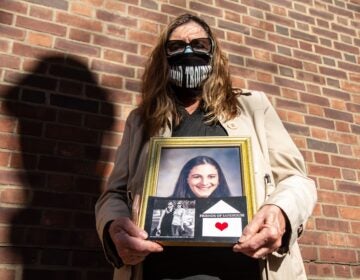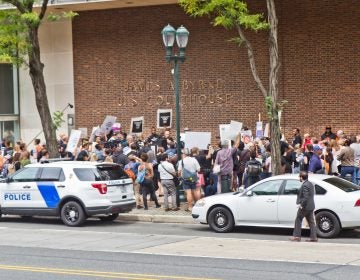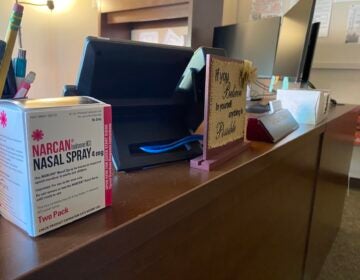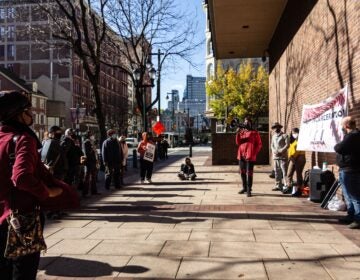Federal appeals court rules Safehouse supervised injection site would be illegal
Reversing the decision of a federal judge in Philadelphia, the appeals court panel ruled, 2-1, that Safehouse would violate U.S. law.
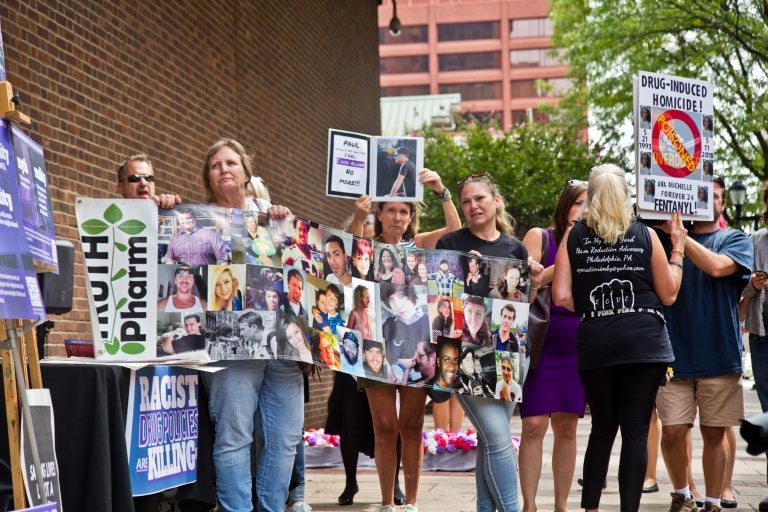
Supervised injection site supporters in Philadelphia rallied outside a federal hearing in 2019 to determine if the proposed Safehouse would violate the federal Controlled Substances Act. (Kimberly Paynter/WHYY)
Updated: 2:27 p.m.
___
In a major blow to the nonprofit Safehouse, a panel of three judges from the U.S. Court of Appeals for the Third Circuit has ruled that a supervised injection site would violate federal law. The nonprofit had plans to open the first such site in the country where people could bring illegal opioids to inject under medical supervision.
In a 2-1 opinion issued Tuesday, Judges Stephanos Bibas and Thomas L. Ambro acknowledged that the number of overdose deaths caused by the opioid crisis does call for innovative solutions but that those solutions “may not violate federal law.”
“Because Safehouse knows and intends that its visitors will come with a significant purpose of doing drugs, its safe injection site will break the law,” the opinion reads.
Safehouse formed in 2018 after the City of Philadelphia announced plans to support a supervised injection site. Its leadership includes Jose Benitez, executive director of the city’s only sanctioned syringe exchange, Prevention Point; Ronda Goldfein, of the AIDS Law Project; and former Pennsylvania Gov. Ed Rendell, who was instrumental in opening Prevention Point despite federal law prohibiting needle exchanges.
Soon after the group formed, in February 2019, U.S. Attorney William McSwain sued the nonprofit, claiming a site where people could bring their own illegal opioids to inject under medical supervision would violate federal law. U.S. District Judge Gerald McHugh ruled in favor of the nonprofit a year later. McSwain swiftly appealed and won.
“The Third Circuit’s opinion is a faithful reading of the statute’s plain language and is consistent with Congress’s intent to protect American neighborhoods from the scourge of concentrated drug use,” McSwain said in a statement Tuesday. “Philadelphia is known around the world as the birthplace of our wonderful nation and of liberty itself. Due to the dedicated work of those at the U.S. Attorney’s Office, it will not be known as the birthplace of heroin injections sites.”
The law in question is section 856 of the U.S. Controlled Substances Act. Passed by Congress in 1986, it is known as the “crackhouse statute” because it was designed during the height of the country’s crack epidemic to cast a wider net for prosecuting drug crimes. The law prohibits anyone from maintaining a place for the purpose of using, selling, or storing drugs. The statute was later applied to those hosting raves where Ecstasy and other drugs were popular.
Attorneys for Safehouse argued that the law does not apply to Safehouse because the central purpose of their site was not, in fact, facilitating drug use but preventing overdoses for those who would be using drugs anyway. The appeals court disagreed.
“Although Congress passed §856 to shut down crackhouses, its words reach well beyond them,” the opinion reads. “Safehouse’s benevolent motive makes no difference. And even though this drug use will happen locally and Safehouse will welcome visitors for free, its safe-injection site falls within Congress’ power to ban interstate commerce in drugs.”
Safehouse board vice president Ronda Goldfein said she was disappointed by the ruling, but that this would not be the end of the road for Safehouse.
“The opinion doesn’t change the science,” she said. “We have an evidence-based initiative that works, that’s still true. That law was not intended to force people to stand by idly while their brothers and sisters are dying.”
Goldfein said that she and her team were reviewing their legal options to determine which strategy would be the best to pursue moving forward, and that they are hopeful that the Biden Justice Department will be more favorable to their initiative.
President-elect Joe Biden was among the principal authors of the crackhouse statute when he was a member of the U.S. Senate, but has considerably shifted his stance on addiction and substance use since then.
In her dissenting opinion, Judge Jane R. Roth agreed that those using Safehouse to inject drugs would be using drugs whether they did it at Safehouse or not.
“If these users are denied access to a Consumption Room, they will still use drugs — and possibly die on the street,” Roth wrote. She went on to point out that Philadelphia’s police and mobile emergency services already administer naloxone after overdoses — the exact service that Safehouse proposes.
“Instead of patrolling the streets for users who have overdosed, Safehouse wants to save lives indoors,” Roth wrote in her dissent. “At oral argument, the government conceded that Safehouse could provide the exact same services it plans to provide in the Consumption Room if it did not do so indoors — if, for instance, it provided a Consumption Room inside a mobile van. Yet, according to the Majority’s interpretation of section 856(a)(2), Safehouse would be committing a federal crime, punishable by twenty years’ imprisonment, if the Consumption Room services were provided inside a building, rather than in a mobile van, parked in front. I cannot interpret section 856(a)(2) to reach such a result.”
Safehouse would have been the first supervised injection site in the United States, but there are 100 such sites around the world, mostly in Europe and Canada. Research shows they are effective at saving lives, as medical professionals trained to use the overdose reversal drug naloxone are standing by while people use drugs, preventing deaths if overdoses should occur.
Philadelphia leads America’s large cities in overdose deaths, with more than 1,150 in 2019. Final mortality figures for 2020 are not yet available, but if they keep pace with those in the early part of the year, it’s likely to be even more deadly.
Philadelphia District Attorney Larry Krasner, who has long feuded with McSwain, expressed dismay at the ruling.
“We must be impatient, and stop relying on the courts to force states to do what is difficult and right,” Krasner said in a statement. “Federal prosecutors have broad discretion not to charge crimes where enforcement is unjust and doing so is bad for society.” He echoed Goldfein’s hope that the Biden administration would look more kindly upon Safehouse.
The appeals panel’s ruling will likely make it difficult for other cities to open similar sites, many of which were eagerly awaiting a precedent-setting decision on Safehouse to guide their own plans to open similar sites. The coronavirus pandemic has exacerbated opioid overdose deaths nationwide.
The case now returns to Judge McHugh at the federal district court level.

Get daily updates from WHYY News!
WHYY is your source for fact-based, in-depth journalism and information. As a nonprofit organization, we rely on financial support from readers like you. Please give today.


